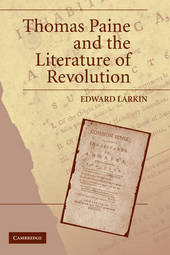
|
Thomas Paine and the Literature of Revolution
Paperback / softback
Main Details
| Title |
Thomas Paine and the Literature of Revolution
|
| Authors and Contributors |
By (author) Edward Larkin
|
| Physical Properties |
| Format:Paperback / softback | | Pages:216 | | Dimensions(mm): Height 229,Width 152 |
|
| Category/Genre | Social and political philosophy |
|---|
| ISBN/Barcode |
9780521153577
|
| Classifications | Dewey:320.51092 |
|---|
| Audience | | Professional & Vocational | |
|---|
| Illustrations |
Worked examples or Exercises
|
|
Publishing Details |
| Publisher |
Cambridge University Press
|
| Imprint |
Cambridge University Press
|
| Publication Date |
10 June 2010 |
| Publication Country |
United Kingdom
|
Description
Although the impact of works such as Common Sense and The Rights of Man has led historians to study Thomas Paine's role in the American Revolution and political scientists to evaluate his contributions to political theory, scholars have tacitly agreed not to treat him as a literary figure. This book not only redresses this omission, but also demonstrates that Paine's literary sensibility is particularly evident in the very texts that confirmed his importance as a theorist. And yet, because of this association with the 'masses', Paine is often dismissed as a mere propagandist. Thomas Paine and the Literature of Revolution recovers Paine as a transatlantic popular intellectual who would translate the major political theories of the eighteenth century into a language that was accessible and appealing to ordinary citizens on both sides of the Atlantic.
Reviews"Edward Larkin's impressive study of Paine's literary achievement takes such moments of rhetorical complexity seriously. This book is really the first to assess Paine's place in eighteenth-century print culture by analyzing a broad range of his writings...Larkin offers historical context and careful rhetorical analysis of well-known writings such as Common Sense, The Rights of Man (1791), and The Age of Reason (1794 95), as well as the less canonical Letter to the Abbe Raynal (1782) and The Letter to George Washington (1796)....The most impressive features of this book are Larkin's willingness to creatively reconceptualize genre and his ability to find important figurative and thematic relations within the Paine canon." -William and Mary Quarterly "the analysis of Paine's writings is illuminating. If there are some who still doubt the sophistication of Paine's thought and the seriousness of purpose with which he challenged hierarchy, Larkin's cogent book should convince them otherwise." -Matthew Rainbow Hale, Goucher College "Larkin's study should strengthen Paine's reputation, and this study should become an important s tarting point for students and teachers of teh Revolutionary period. Larkin has done Paine, and us, a great service." - Scott Slawinksi, Western Michigan University "Only in htel ast few decades have scholars begun to take a balanced view of Paine, and a recent spate of books and articles on his tempestuous career and powerful pen bode well for a fuller understanding of this itnriguing individual. Among the best of these recent works, Edward Larkin's literary study of Paine's prose is a much needed complement of the political, historical, and philosophical emphases of other books and articles. Larkin reconstructs the significance of Paine's editorship of the Pennsylvania Magazine as a touchstone for the idea of an inclusive American public." - Ben Ponder, Northwestern University The Pennsylvania Magazine of History and Biography
|